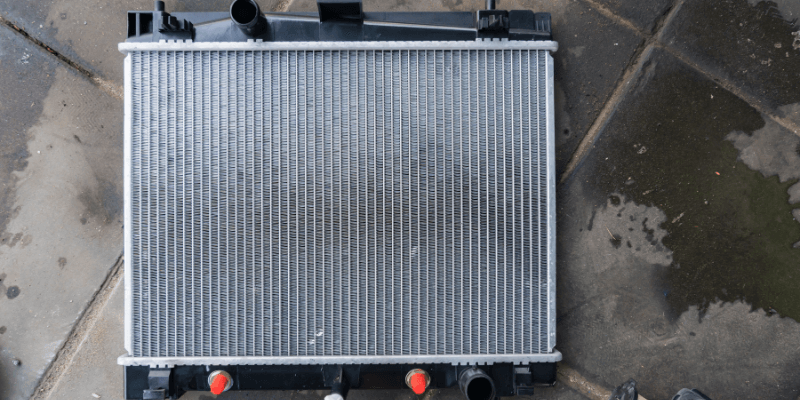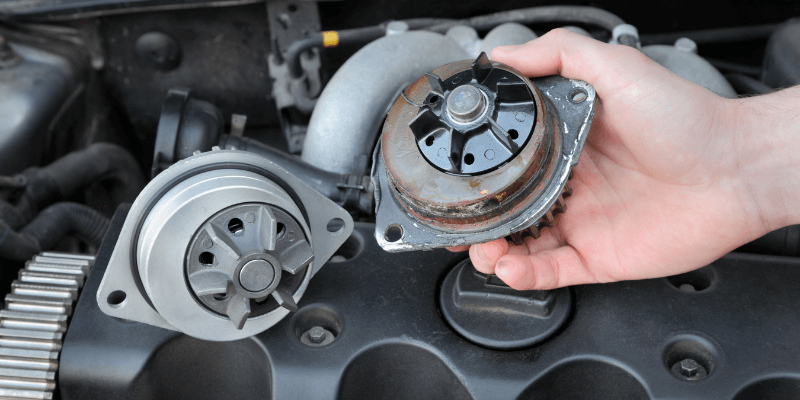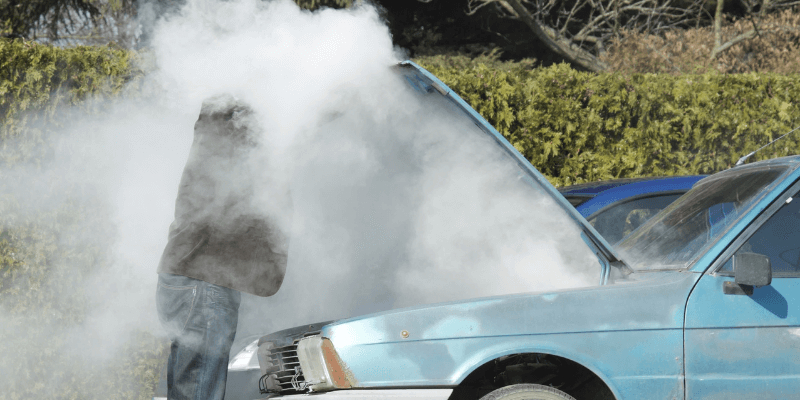 Swipe for more categories
Swipe for more categories 
Why is my Car Overheating?: What Causes a car to Overheat
Why is my Car Overheating?: What Causes a car to Overheat
When summer time comes around, many people like to hit the road. Families pile into their cars for road trips to tourism destinations or beach communities. However, summer gets hot and vehicles heat up right along with the seasonal temperatures. Car overheating occurs more often during the summer season than any other time of year. Driving a car that is overheating is terrible for the vehicle and unsafe for you and your passengers. Steam or smoke begins to billow from the hood of your car and, before long, you’re stuck on the side of the road with an undriveable vehicle. That’s why it’s important to know what causes a car to overheat and what to do when your car overheats.
Why Do Cars Overheat / Reasons for Car Overheating
A Car overheats when the engine is producing too much heat, and the heat is not being properly released from the engine compartment. Every car is built with a cooling system comprised of components designed to relieve the engine compartment of excessive heat. When the cooling system components fail to absorb, transport, or release the excess heat from the engine, this is what makes a car overheat. The most common reasons for engine overheating are:
- Coolant Leak: If you find your car leaking coolant, this is one of the most common causes of engine overheating. A leak in the cooling system can be found in the radiator, water pump, hoses, head gasket, or thermostat housing.
- Blocked Coolant Hose: The hoses transport the engine coolant throughout the cooling system. If the hoses have dirt or debris that block the flow of the fluid inside them, the engine will not be properly cooled. Performing a coolant flush is the recommended course of action.
- Coolant Issues: Different engines require different types of antifreeze coolant. If you put the wrong coolant fluid in your vehicle, the engine may not be able to cool adequately. It’s also important to be sure that the coolant/water mixture is correct. If either of these issues are causing the engine to overheat, a coolant flush must be done.
- Blown Head Gasket: The head gasket keeps coolant and oil from mixing together as they pass from the engine block to the cylinder head. A malfunctioning head gasket can cause overheating. However, a healthy gasket can also fail if another component causes the engine to overheat.
- Thermostat: The thermostat sits between the engine and the radiator and controls the flow of the engine coolant from the radiator to the engine and vice versa. If the thermostat is broken or stuck, it will not correctly read temperature, and will not open the flow of cool fluid to the engine or hot fluid to the radiator.
- Radiator: The radiator is where the coolant fluid is sent once it absorbs the heat from the engine. If the radiator isn’t functioning properly, the fluid will not cool is intended. This could be a problem with the radiator fan or the component itself.
- Bad Water Pump: The Water Pump is a vital piece of the cooling system, as it propels the coolant fluid through the system. If the water pump malfunctions, the coolant fluid will not be pushed through the system. If the coolant isn’t traveling through the hoses and components, it cannot serve its purpose.
Maximize your fuel economy with the right maintenance and repairs with Drivesmart!
Get a Quote Today!
Bad Radiator: Radiator Repair Services

Bad Radiator: Radiator Repair Services
A car radiator is a heat exchanger that transfers the heat of the fluid flowing through it to the air that blows through it from the front of the vehicle. When the radiator fails to do its job, the engine is not being given the opportunity to cool down. When this occurs, the radiator parts or adjoining components need to be repaired or replaced. These are the most common radiator issues:
- Radiator Hose Leaks: There are two hoses connecting the radiator to the engine for the coolant fluid to flow through. One hose carries the cool fluid to the engine. The other sends fluid carrying heat from the engine back to the radiator. Over time, these hoses will become worn, cracked, and brittle. It’s wise to regularly check these hoses for signs of wear in order to prevent radiator hose leaks.
- Radiator Leak: A radiator leak is not as common as a leak in the hoses, but it can become a problem. Radiator leaks are usually the result of corrosion. Radiators are primarily comprised of metal, and, if treated carelessly, will rust. If you don’t use the proper engine coolant for your coolant system, this can cause corrosion and leaking. It’s also advised that you mix the coolant with distilled water as opposed to tap water. Using tap water when mixing coolant can result in rust in the radiator due to the minerals contained within the water.
To find leaks in a radiator, most mechanics submerge the radiator in water and blast compressed air through the inlet ports. Any leak points would then begin to bubble. If you suspect you have a leak in your radiator, you can turn on your engine and let it run while looking for steam to expel from leaking point the radiator. If the leak can be isolated and patched, radiator leak repair can be simple. If not, radiator replacement is the only recourse.
- Radiator Cap: The radiator cap increases the boiling point of coolant in the system and acts as a pressure-release valve. When the fluid in the cooling system heats up, it expands and creates pressure. The spring in the radiator cap is set to a pressure point, and when that pressure point is reached, the valve opens to let out steam. The water in the steam is then replaced in the system from the expansion tank.
If the radiator cap is not performing correctly, there will be excess pressure or suction in the car cooling system. If the radiator hoses are collapsed, this is a sign of negative pressure (suction) caused by a faulty radiator cap. Collapsed hoses will halt the flow of fluid in the system. Conversely, if the engine boils over, it will cause steam to rise from under the hood of the car. This means there is too much pressure in the system and the radiator cap is not alleviating this correctly.
- Radiator Fan: If the car overheats when idling, the culprit is likely the radiator fan. This fan is designed to facilitate the interaction of cool air with the radiator for the purpose of lowering the temperature of the coolant contained within. If the fan isn’t spinning when the car is not in motion, there is little to no air cooling the radiator. When the car is in motion, there is a decent amount of air hitting the radiator from the grill between the headlights. If the radiator fan or it’s motor needs to be replaced, you will notice your car overheating when idle.
Bad Water Pump Symptoms: Signs of a Bad Water Pump

Throughout this article, it’s been mentioned that the cooling system relies on antifreeze coolant to run through the circuit of the system to properly cool the engine compartment. The water pump is the source of power behind this activity. Without the water pump, the coolant would have nothing to force it to flow through the tubes to the components that need to be cooled. The following are signs of a bad water pump:
- Coolant Leak Under Engine: A water pump is comprised of seals and gaskets that store and deliver antifreeze coolant to the engine and radiator. The seals and gaskets will eventually wear, dry up, or crack. When this occurs, the water pump will leak coolant under the vehicle. If the leak is coming from the pump, it will drip under the center of the engine. The fluid will be a green or red color, depending on the fluid in the system.
- Rust and Corrosion: Much like the radiator, using the wrong coolant fluid or an improper mixture of fluid will cause rust and corrosion to the water pump. Mineral deposits in the pump will slow the pump’s performance and thusly slow the engine cooling effect. Upon visual inspection, you may find small corrosion holes in the metal mounting surface.
- High Pitch Sound: If the water Pump is emitting a high pitched whining sound, this could indicate that the water pump pulley is loose. It could also mean that the bearings in the water pump are wearing out. Once the bearings fail inside the water pump, the pump cannot be repaired and water pump replacement is the only option.
- Steam Coming from Radiator: If the pump is not functioning correctly, the coolant fluid is not moving through the cooling system properly. The hot coolant will reach its boiling point and become steam that will billow from beneath the hood of the car. This is the tell-tale sign that your car is overheating.
What to Do When Car Overheats

The last thing you want to occur when your heading down the highway with your family is to see the dashboard temperature gauge rise. Steam then starts shooting from the hood of your car and you realize, “My car is overheating!”. Where many people panic, you can manage the situation safely and save yourself from an expensive repair bill by knowing what to do if your car overheats.
- If your car appears to be overheating, the first thing to do is shut off the air conditioner, and open all windows. This will decrease the work of the engine and help it cool down.
- If the vehicle is still overheating, turn on the heater and blowers. This will send heat from the engine to the passenger compartment. It’s a very helpful step to take to reduce the engine’s heat, though it may make you and you passengers uncomfortable.
- If the vehicle is stopped but the temperature gauge is rising, put the car in park and rev the engine. Doing this will speed up the action of the water pump and radiator fan.
- If the engine is about to boil over (steam begins shooting from the hood), pullover to a safe location and shut off the engine. Refrain from opening the hood until the car has cooled completely. Monitor the temperature gauge to see if the needle has gone from hot to cool.
Check the coolant level in the radiator. If the radiator cap is hot, do not attempt to open it. If the pressure in the system is still too high, steam and boiling fluid will erupt from the radiator when the cap is removed.
If you have coolant on hand, and the coolant level seems low, fill the radiator with as much fluid as possible. Check the radiator hoses to ensure they are properly attached, and restart the engine. If the vehicle isn’t keeping a decent temperature after this is done, do not drive the vehicle. Contact an auto facility that can tow the vehicle safely.
Overheating Car Damage
When your car is overheating, it’s important to pull over and turn off the engine as soon as possible. If the engine is worked too hard and exposed to too much heat, it can result in serious damage. Excessive heat can warp the cylinders in the engine. Dramatic temperature changes can crack the engine block (never spray cold water on a hot engine). The seals and gaskets are built to withstand a reasonable amount of heat, but if the vehicle is overheating, they can be destroyed.
Having a good protection plan for your vehicle is a great way to avoid the burden of the high-cost repairs. Since overheating can lead to such severe engine problems, getting a quality protection plan is a perfect evasive step to get around the massive fees associated with engine repair and replacement.
Drivesmart’s Advantage plan is the perfect plan for those concerned about overheating issues. Advantage covers the most expensive components of the cooling system; such as the radiator, water pump, cooling fan, and the coolant overflow tank. This plan also covers the engine itself; ensuring that once your vehicle overheats, whatever damage is done will be covered. If your vehicle has less than 175,000 miles, the Advantage plan is a perfect plan for you!


